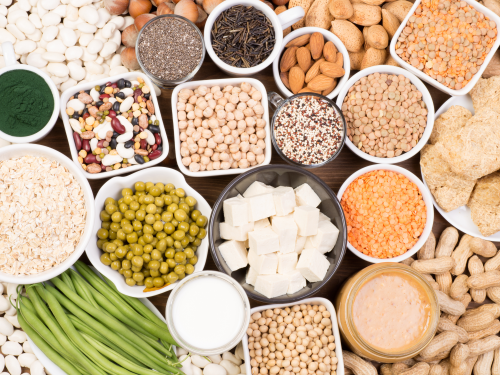Protein is a crucial nutrient that plays a fundamental role in hitting weight loss and fat loss goals! People who eat adequate protein report greater feelings of satiety and appetite control. In addition, protein raises the number of calories you burn through thermogenesis.
- Increases Satiety and Reduces Appetite: Protein is one of the most satiating macros. When you eat protein, it takes time for your body to digest it, leaving you feeling fuller and more satisfied after a meal. Protein digests and is absorbed over hours. Increasing satiety after a meal is important for appetite control. If you’re not satisfied, you’re more likely to continue to eat or snack shortly after the meal is over.
- Increases Energy Expenditure: For weight loss, you need to burn more calories than you consume. Luckily, you can increase the number of calories you burn just by adding more protein to your meals. That’s because protein requires your body to work harder to digest. This is called the thermic effect of food or TEF. Another way to increase your daily calorie burn is by building muscle. Having more muscle in your body is associated with a greater resting metabolic rate AKA the number of calories your body burns at rest. Protein is required for building and maintaining muscle. If you don’t have a lot of muscle, you can build it by adding resistance training and increasing the amount of protein in your diet.
Here are three valuable tips to ensure you’re getting enough protein.
1: Diversify Your Protein Sources: To ensure you’re getting enough protein, it’s essential to diversify your protein sources. Yes, tofu is a classic vegan protein staple, but ADD in other options so you can enjoy a variety of flavors and nutrients. The more variety of meals you are eating the easier it will be for you to get your nutrients on a plant-based diet. Consider these options: lentils, textured vegetable protein (pea or soy-based), tempeh, seitan, edamame, soy curls, Greek-style yogurt, legume pasta (SO many on the market these days), protein powder, protein waffles, protein pancakes, and protein pudding. Each of these foods provides a unique combination of amino acids, ensuring you get a wide range of essential nutrients.
2: Prioritize Protein-Rich Snacks: Snacking is an excellent opportunity to boost your protein intake. Instead of reaching for empty-calorie snacks, like cookies or chips on their own! Try pairing these foods with nuts (think almonds), seeds (think pepitas), Greek-style yogurt, or edamame. These snacks provide sustained energy, promote satiety, and support muscle maintenance and repair. These snack combos are high in protein OR healthy fats and can help stabilize blood sugar levels, reduce cravings, and help prevent overnight snacking.
3: Plan Balanced Meals: To ensure you consistently meet your protein needs, plan balanced meals that incorporate protein-rich ingredients. An example of a balanced plate would include a protein source (think seitan or edamame), a variety of colorful vegetables (this adds color and fiber like Brussel sprouts), and ideally a high-fiber carbohydrate (think bulgur wheat or quinoa). Experiment with different meal combos to keep your meals exciting and protein-packed to hit your goals!
Remember to listen to your body’s hunger cues and adjust your protein intake as needed to support your unique health goals and lifestyle.
Need help navigating your meals during your weight loss journey, schedule a Free Consultation Call with me, a Vegan Registered Dietitian.

